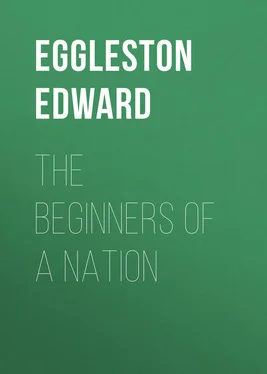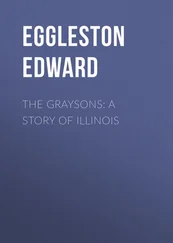Edward Eggleston - The Beginners of a Nation
Здесь есть возможность читать онлайн «Edward Eggleston - The Beginners of a Nation» — ознакомительный отрывок электронной книги совершенно бесплатно, а после прочтения отрывка купить полную версию. В некоторых случаях можно слушать аудио, скачать через торрент в формате fb2 и присутствует краткое содержание. Жанр: История, foreign_antique, foreign_prose, на английском языке. Описание произведения, (предисловие) а так же отзывы посетителей доступны на портале библиотеки ЛибКат.
- Название:The Beginners of a Nation
- Автор:
- Жанр:
- Год:неизвестен
- ISBN:нет данных
- Рейтинг книги:4 / 5. Голосов: 1
-
Избранное:Добавить в избранное
- Отзывы:
-
Ваша оценка:
- 80
- 1
- 2
- 3
- 4
- 5
The Beginners of a Nation: краткое содержание, описание и аннотация
Предлагаем к чтению аннотацию, описание, краткое содержание или предисловие (зависит от того, что написал сам автор книги «The Beginners of a Nation»). Если вы не нашли необходимую информацию о книге — напишите в комментариях, мы постараемся отыскать её.
The Beginners of a Nation — читать онлайн ознакомительный отрывок
Ниже представлен текст книги, разбитый по страницам. Система сохранения места последней прочитанной страницы, позволяет с удобством читать онлайн бесплатно книгу «The Beginners of a Nation», без необходимости каждый раз заново искать на чём Вы остановились. Поставьте закладку, и сможете в любой момент перейти на страницу, на которой закончили чтение.
Интервал:
Закладка:
VI
Motives of sentiment. In the preceding sections of this chapter we have traced what may be called the series of commercial motives that, sometimes in succession, often in co-operation, propelled the Virginia movement. The agitation for a colony was primarily a commercial one. The London or Virginia Company by which it was carried forward had been organized in the form of the great trading corporations of the time, such as the Muscovy Company and the East India Company, and it was expected to yield large returns. But though commercial in form and purpose, the Virginia Company from the outset was able to appeal successfully in every emergency to motives that were far from mercenary. Into the chain-threads of commercial enterprise was woven a woof of patriotic feeling and religious sentiment.
VII
Rise of the patriot party in the Virginia Company. Dale's empty-handed return, and Argall's homecoming with hands full of the spoil of both colony and colonists, were severe blows to the hope of profit from Virginia, and thereafter commercial motives fell to a second place. The company began to pass more and more out of the control of traders like Sir Thomas Smyth and Alderman Johnson, and the corrupt clique of predatory merchants, as well as out of the reach of voracious noblemen like Warwick. More and more it passed into the hands of the great liberal statesmen whose leader was the incorruptible Sir Edwin Sandys, a man of rare gifts and knowledge and of great resoluteness. These men had suffered some disappointment, no doubt, in their struggle for parliamentary freedom in England. They might have succeeded better had their antagonist been a strong king, but against the pusillanimity, the vanity, the vacillation, and the pedantic dogmatism of James little permanent headway could be made. Without relinquishing the conflict in the House of Commons, they took it up in the Quarter Courts of the Virginia Company. In this new field they found themselves afresh confronted by the obstinacy of the king, who was stirred up to oppose them by the discarded governor, Sir Thomas Smyth, and his friends, by Warwick, and by all the partisans of high prerogative and all the advocates of the Spanish match. Woodnoth's Short Collection, p. 6. "Bedchamber men" and others about the king's person were engaged to work upon the king to come to the rescue of Sir Thomas Smyth's "honor." Peckard's Ferrar, 113. The Spanish ambassador Gondomar, who had spies in the Virginia Company, took pains to feed James's discontent. He told the king that it was time for him to look into the Virginia courts, which were held in the great hall of the house of the Ferrar family. Too many of the king's nobility and gentry resorted thither, in order to be in company with the popular Lord Southampton and the dangerous Sandys. They were deep politicians, and they entertained designs beyond a tobacco plantation. Their leaders, he said, were "subtle men of high courage who regarded neither his master nor their own."
Sir Edwin Sandys. Sandys, as assistant to Sir Thomas Smyth and virtual governor, had already succeeded in establishing in Virginia a constitutional state with a representative government. Royal Hist. MS. Comm. viii, II, 45. He was furthering plans for the foundation of the little separatist state of New Plymouth, and his enemies set agoing tales that he had dark designs of removing with the Pilgrims to America, in order to found a democratic state there. In 1619 Sir Thomas Smyth tendered his resignation, and the company, to his surprise, it would appear, accepted it, and chose Sandys to his place. When, in 1620, his first year of government drew to a close, Sir Edwin Sandys erected an elegant ballot-box in the midst of the hall of the Ferrars, that the brilliant assemblage of noblemen, knights, gentlemen, and merchants might by a secret vote exercise the right of choice without any constraint. The king's interference. Just as the assemblage was about to begin voting, two clerks of the signet were announced with a message from the king forbidding the company to choose Sandys. 1620. "Choose the devil, if you will, but not Sir Edwin Sandys," was one form in which the king expressed his aversion. Southampton, braving the king's displeasure, allowed himself to be elected, with Sandys for deputy. In June, 1621, both Southampton and Sandys were imprisoned. A land of freedom. This attracted attention to Virginia as a "refuge from a more oppressive government in England." In three months' time twenty-five ships set sail for the colony, which gained an impetus from the king's opposition that put it beyond the danger of destruction by the calamities of the next two years. Even before the massacre and pestilence of 1622 and 1623, Southampton was assured by friends at court that it would come to "push of pike," and that the company would be overthrown. 34The charter of the company was vacated in 1624, but free government had so taken root in the colony that it could never afterward be quite extirpated. A new English state with a popular government had been founded of deliberate purpose by a group of English statesmen, at the head of which, and easily first, was Sir Edwin Sandys, whose great service to the people and nation that were to come has been almost forgotten.
VIII
Religious propagandism. We shall not have taken a just account of Virginia colonization if we do not reckon religious motives among the many forces that carried that wavering enterprise to success. From the excitement about American exploration and colonization the English church caught its first missionary impulse. The Indian captives brought from America at various times gave to Englishmen the novel sight of men and women from beyond the bounds of Christendom; people who had never been baptized, and had never learned to wear English garments, "naked slaves of the devil," as one of the early Virginia clergymen described them. To the benevolent desire of Englishmen for the deliverance of the savages from devil-worship and semi-nudity, there was added the natural wish for ecclesiastical extension. The separation of England from the Roman hierarchy had been a blow to the aspiration for an unattainable catholicity cherished in one form or another by Christian ecclesiastics of almost every school. It was not possible that the great men who were leaders of the English church in the reigns of Elizabeth and James should be content with the narrow limits of "the little English paddock," while Spanish conquerors and missionary priests were winning for the Roman communion a new and vast dominion in America. 35English ecclesiastics felt keenly the reproach made against them by the Roman Catholics that they were not "converters of infidels."
Zeal of the clergy. Perhaps the earliest of all Anglican missionaries was Robert Hunt, the first minister in Virginia, a light shining in a dark place indeed. He bore with unfaltering courage and a sweet-hearted patience rarely equaled in the history of martyrdom the accumulating miseries of Jamestown, until he also perished in the general mortality. His nobleness of spirit softened the detestable rivalries of the early leaders. The most active and influential writers in favor of colonization were clergymen such as Hakluyt, Symonds, Purchas, and Crashaw. Other clergymen, following in the footsteps of Hunt, risked life itself in the Virginia colony, while devout laymen spent their money in its behalf. Thus did Anglican zeal further a colonization that, by a curious perversity of outcome, resulted in founding a nation of dissenters.
IX
The Ferrars. In the great hall of the house of Nicholas Ferrar, a London merchant, the courts or meetings of the Virginia Company were held for years. The two sons of this Nicholas Ferrar, John and Nicholas, served in turn as deputy governors of the Virginia Company. This pious Ferrar family, as it became influential, lent to the scheme of colonizing Virginia something of the air of a project for propagating the gospel. Nicholas, the father, gave money for the education of infidels in Virginia. A school was founded there by the gifts of the pious, and rewards were given to those colonists who would educate Indian children in their families. After the younger Nicholas, who was a man of remarkable zeal and activity, tinged with a romantic enthusiasm, became deputy in 1622, the production of silk and wine and iron and the educating of Indians in Christianity traveled on abreast. A college was proposed, for which an endowment of thirteen hundred pounds was collected, and to which a valuable library was bequeathed by a settler. Practical men grumbled at the prematurity of all this, and complained of those in charge that "they spent Michaelmas rent in mid-summer moone." The governor of the colony, honest Sir Francis Wyatt, wished that "little Mr. Ferrar were in Virginia, where he might add to his zeal a knowledge of the country."
Читать дальшеИнтервал:
Закладка:
Похожие книги на «The Beginners of a Nation»
Представляем Вашему вниманию похожие книги на «The Beginners of a Nation» списком для выбора. Мы отобрали схожую по названию и смыслу литературу в надежде предоставить читателям больше вариантов отыскать новые, интересные, ещё непрочитанные произведения.
Обсуждение, отзывы о книге «The Beginners of a Nation» и просто собственные мнения читателей. Оставьте ваши комментарии, напишите, что Вы думаете о произведении, его смысле или главных героях. Укажите что конкретно понравилось, а что нет, и почему Вы так считаете.












